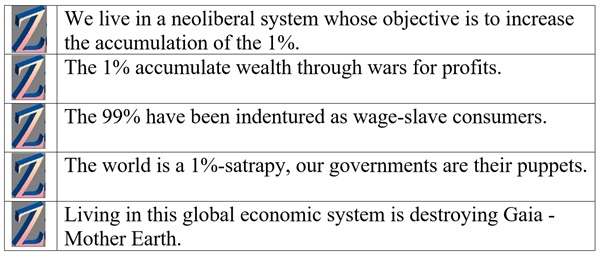|
|
 The path of compassion, insight and creativity - the struggle for GAIA and against the 1%-satrapy of war and wage-slavery.
The path of compassion, insight and creativity - the struggle for GAIA and against the 1%-satrapy of war and wage-slavery. |
| |
| This is a continuation of my zandtao blog. |
|
Email Zandtao:- |
|
|
|
 Zandtao Blog Links page Zandtao Blog Links page |
|
Gaia-conscious Buddhism This ought to be a tautology, why? Ajaan Buddhadasa talks of idappaccayata as God – Gaia. So if the religion is Gaia, then why is it not a tautology? I just saw a very vitriolic post attacking spiritual teachers, and the basis of the attack is that these spiritual teachers are not making the spirit sufficiently active. Gaia-consciousness, in my view, is active so in a less vitriolic way I want to investigate that attack. Buddhism has monks as teachers, and within Buddhist countries monks are often at the forefront of what is positive in those countries. This would include Gaia-conscious Buddhism where the monasteries have sustainable aspects, and the monks teach mindfulness although not always mindful consuming. As a positive example, in Thailand the recently-deceased King (who was very popular) promoted an initiative called Buddhist economics or sufficiency economics, but whilst this produced some change the people especially business did not follow the initiative sufficiently as is evidenced by Bangkok still being a consumer hub for the region with tourists travelling to Thailand for consumerism - amongst others; Thailand also does not have an electric car (EV) infrastructure. Whilst there are countries that call themselves Buddhist it is not Buddhism that controls the economy in those countries, those economies are not sufficiency economies. Buddhism has great influence in Asia but at the same time Asian countries are consumer economies. This is not Gaia-conscious – mindful consuming. Whilst the monks have a positive influence on political power they do not control business interests especially as the monasteries require contributions from the rich to maintain their institutions. Whilst Asian leaders are active and influential in the global economy, there is not an example of imperialism such as the indigenous genocide coming from western colonialism. However China tends to be expansionist and are very powerful in the region. Tibetans argue that China invaded their country exiling the Dalai Lama, on the surface this would appear the worst example; in general I think Chinese people do not see it this way. There is however always talk of human rights abuses in China as an example this Guardian article describes the poor treatment of China’s Uyghur Muslim minority. However it is undoubtedly the case that the West, particularly the US, highlights China’s human rights record as a diplomatic tactic. Currently in Myanmar there is an appalling attack on Rohingya Muslims leading to significant migration. And on the Thai-Malay border there is ongoing disruption within 3 Thai districts that in the 18th century were part of Malaysia. So whilst Buddhism is a Gaia-conscious religion/philosophy it has to be recognised that countries which are nominally Buddhist participate within the consumerist economic system. It is clear that Gaia-consciousness is not a leadership virtue in these countries. So how widespread is Gaia-consciousness amongst Buddhists in general? And here we have to consider the criticism of the spiritual teaching, not necessarily agree but consider. There is the important teaching of the 4 Noble Truths. This recognises that there is suffering, and individually we suffer because we don’t control our desires – we cling to them. To stop clinging we do not attach to desires – detach from desires. This is extremely difficult to do, and for some teachers this practice of detachment leads to accepting a withdrawal from being too active in life. This is the criticism I mentioned above. There are monks withdrawn into cloisters and some meditators also withdraw. For some this withdrawal is perceived as shirking their responsibility (to Gaia). For me my learning is as Buddhadasa said “learning what is”, and this learning includes an understanding of political power in the world. Life is humanity’s systems as well as Nature, shouldn’t we learn about both? As for the 4 Noble Truths there is suffering, and suffering is as a result of clinging to desire – attachment. Where does this suffering come from? Firstly misunderstanding Nature – trying to get from Nature what Nature does not offer. Living in harmony with Nature means we know how to give and take:-  But what about humanity’s system? Here is a description of it:-  By this understanding we are consumers, no give-and-take, just consumers, no harmony. We are conditioned to consume. If we don’t learn that this is what it is, will we just consume in ignorance? Is this Gaia-conscious? Is this harmony with Nature? Buddhism talks about removing conditioning and moving beyond. Buddhadasa called this Idappaccayata-paticcasamuppada. It is not simply the conditioning of consuming but the conditioning of the 5 khandhas, however doesn't awareness of this conditioning lead to mindful consuming? The person who was aggressive about the spiritual teachers wants to insist on engagement, personally I see that as a choice no matter how frustrating that feels at times. Following our paths is difficult especially because of the inimical way humanity’s systems are applied. We must encourage people to follow their path, and if that path is focussed on the internal at some stages perhaps this is not to be criticised. The inimical systems cause great hardship, perhaps those on the path should question their own egos before adding to that hardship. The path is compassion and leads to Gaia, trust in Gaia. Ask questions, encourage positively, but remember our paths are different. However frustrating it is to see people inactive on the path it is their choice, their minds, their path – trust Gaia.
| |||
| Books:- Treatise, Pathtivism Manual, Wai Zandtao Scifi, Matriellez Education. Blogs:- Matriellez, Mandtao. |